|
|
|
Sort Order |
|
|
|
Items / Page
|
|
|
|
|
|
|
| Srl | Item |
| 1 |
ID:
023866
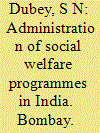

|
|
|
|
|
| Publication |
Bombay, Somaiya Publications, 1973.
|
| Description |
xi, 214p.
|
| Series |
Institute of Social Sciences Series; no.27
|
|
|
|
|
|
|
|
|
|
|
|
Copies: C:1/I:0,R:0,Q:0
Circulation
| Accession# | Call# | Current Location | Status | Policy | Location |
| 012224 | 361.954/DUB 012224 | Main | On Shelf | General | |
|
|
|
|
| 2 |
ID:
118961
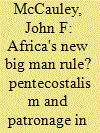

|
|
|
|
|
| Publication |
2013.
|
| Summary/Abstract |
The concept of 'big man rule', conventionally invoked to refer to a kinship-based relationship between patron and client, is now finding application in the charismatic Pentecostal movement in Africa. This article explores why new Pentecostalism emerges as an alternative to traditional clientelism, and how well the analogy of big man rule applies. It traces the Pentecostal form of big man rule to four socio-economic transformations: ongoing weakness in the state's ability to provide social welfare; a change in social values in the wake of the global financial crisis; expanding state control over customary activities; and urbanization. Drawing on data collected from both patrons and clients in Ghana, the article shows that Pentecostalism mirrors traditional big man rule by encouraging members to break from their past, to trust leadership, and to commit exclusively to their religious social network. Among church leaders, Pentecostalism also encourages internal competition and the provision of social services. Most importantly, the movement creates pay-off structures that replicate the exchange of resources for loyalty central to big man rule. The implication is that Pentecostalism's success as an alternative informal institution is not a function of Weberian ethics or occult spiritualities, but rather its ability to fill voids left by the state and to provide new social networks.
|
|
|
|
|
|
|
|
|
|
|
|
|
|
|
|
| 3 |
ID:
132006
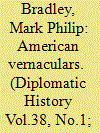

|
|
|
|
|
| Publication |
2014.
|
| Summary/Abstract |
On a wintry January evening in 1973, the members of Amnesty International USA Group 11 gathered on the Upper East Side of New York City to adopt a new prisoner of conscience, Sutanti Adit of Indonesia. Adit, a medical doctor and the wife of the leader of the Indonesian Communist Party, had been arrested and imprisoned in the ruthless campaigns of repression that followed a failed 1965 coup against the Sukarno government, which had ruled Indonesia since its formal independence from Dutch colonial control in 1950. She was among more than a hundred thousand Indonesians arrested, interrogated (often under torture), and imprisoned by the state. As many as fifty thousand of them remained in custody for more than a decade housed in prison camps whose sanitation, medical facilities, and food were inadequate at best. They were permitted very limited contact with the outside world, including family and friends, and harshly mistreated by prison guards.1
|
|
|
|
|
|
|
|
|
|
|
|
|
|
|
|
| 4 |
ID:
125613
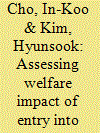

|
|
|
|
|
| Publication |
2013.
|
| Summary/Abstract |
This paper calculates the welfare impact of a new entrant based on the location of entry in the Korean electricity market. We use two different models. One is the optimal fuel mix model to estimate the effect of a new entry in the long run. The other is the variable cost minimization model to assess the contribution of an existing installed private generator in the short run. A specific private generator, which has a cost advantage, saves a substantial amount of system-wide variable costs. We show that the right location for a new entrant can save power generation costs significantly, even if a new entrant does not have a cost advantage.
|
|
|
|
|
|
|
|
|
|
|
|
|
|
|
|
| 5 |
ID:
124708
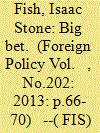

|
|
|
|
|
| Publication |
2013.
|
| Summary/Abstract |
THE TAIWANESE ISLANDS of Matsu do not seem like an ideal spot for one of the world's biggest casinos. Although they are ringed by rocky beaches and azure water, only about 10,000 people live on the 19 tightly clustered flyspecks, some 126 miles away from the main island Taiwan. An Associated Press reporter who visited in 2012 described Matsu's few shops as "a complex of decaying concrete structures that are most notable for their low-wattage gracelessness." Besides a small tourism industry, the islands' chief draw is sorghum-based liquor that, to the uninitiated, smells like embalming fluid.
|
|
|
|
|
|
|
|
|
|
|
|
|
|
|
|
| 6 |
ID:
097900
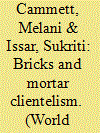

|
|
|
|
|
| Publication |
2010.
|
| Summary/Abstract |
In plural societies, social welfare can be a terrain of political contestation, particularly when public welfare functions are underdeveloped and ethnic or religious groups provide basic social services. It is well established that such organizations favor in-group members, but under what conditions do they serve out-group communities? To address this question, the authors compare the welfare programs of the predominantly Sunni Muslim Future Movement and the Shia Muslim Hezbollah in Lebanon. Although they operate under the same institutional rules and economic contexts and boast the largest welfare programs in their respective communities, the Future Movement aims to serve a broader array of beneficiaries, including non-Sunnis, whereas Hezbollah focuses more exclusively on Shia communities. Based on analyses of an original data set of the spatial locations of welfare agencies, qualitative data from interviews with providers and beneficiaries, and case studies of areas where the two parties established and did not establish welfare agencies, the authors argue that distinct political mobilization strategies-whether electoral or nonelectoral-explain different patterns of service delivery across the two organizations.
|
|
|
|
|
|
|
|
|
|
|
|
|
|
|
|
| 7 |
ID:
025013
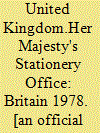

|
|
|
|
|
| Publication |
London, Her Majerty's Stationery Office, 1978.
|
| Description |
ix, 488p.Hbk
|
| Standard Number |
0117009253
|
|
|
|
|
|
|
|
|
|
|
|
Copies: C:1/I:0,R:0,Q:0
Circulation
| Accession# | Call# | Current Location | Status | Policy | Location |
| 017630 | 941.032/UNI 017630 | Main | On Shelf | General | |
|
|
|
|
| 8 |
ID:
036514
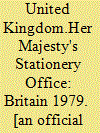

|
|
|
|
|
| Publication |
London, Her Majesty's Stationary Office, 1979.
|
| Description |
ix, 490p.Hbk
|
| Standard Number |
0117009717
|
|
|
|
|
|
|
|
|
|
|
|
Copies: C:1/I:0,R:0,Q:0
Circulation
| Accession# | Call# | Current Location | Status | Policy | Location |
| 018060 | 941.032/UNI 018060 | Main | On Shelf | General | |
|
|
|
|
| 9 |
ID:
033714
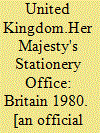

|
|
|
|
|
| Publication |
London, Her Majesty's Statinery Office, 1980.
|
| Description |
ix, 487p.Hbk
|
| Standard Number |
0117009792
|
|
|
|
|
|
|
|
|
|
|
|
Copies: C:1/I:0,R:0,Q:0
Circulation
| Accession# | Call# | Current Location | Status | Policy | Location |
| 018912 | 941.032/UNI 018912 | Main | On Shelf | General | |
|
|
|
|
| 10 |
ID:
036432
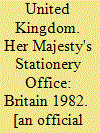

|
|
|
|
|
| Publication |
London, Her Majesty's Stationary Office, 1982.
|
| Description |
ix, 421p.: maps.Hbk
|
| Standard Number |
0117010243
|
|
|
|
|
|
|
|
|
|
|
|
Copies: C:1/I:0,R:0,Q:0
Circulation
| Accession# | Call# | Current Location | Status | Policy | Location |
| 020219 | 941.032/UNI 020219 | Main | On Shelf | General | |
|
|
|
|
| 11 |
ID:
033818
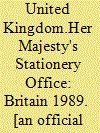

|
|
|
|
|
| Publication |
London, Her Majesty`s stationery office, 1989.
|
| Description |
viii, 484p.Hbk
|
| Standard Number |
0117013870
|
|
|
|
|
|
|
|
|
|
|
|
Copies: C:1/I:0,R:1,Q:0
Circulation
| Accession# | Call# | Current Location | Status | Policy | Location |
| 029960 | 941.032/UNI 029960 | Main | On Shelf | Reference books | |
|
|
|
|
| 12 |
ID:
024921
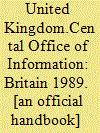

|
|
|
|
|
| Publication |
London, Her Majesty's Stationery Office, 1989.
|
| Description |
viii, 484p.Hbk
|
| Standard Number |
0117013870
|
|
|
|
|
|
|
|
|
|
|
|
Copies: C:1/I:0,R:1,Q:0
Circulation
| Accession# | Call# | Current Location | Status | Policy | Location |
| 030901 | 941.032/UNI 030901 | Main | On Shelf | Reference books | |
|
|
|
|
| 13 |
ID:
126026
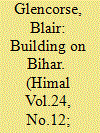

|
|
|
|
|
| Publication |
2011.
|
| Summary/Abstract |
Poor infrastructure, weak human capacity, politicised local bureaucracies, difficult caste relations, debilitating power shortages and deeply entrenched poverty - driving around Bihar recently, it was clear that the state has yet to transform into the orderly, prosperous society that recent press coverage has suggested. That said, there is no doubt that a nascent but carefully structured institutional reform process is allowing for the slow emergence of a 'naya' Bihar. Since 2005, the government of Nitish Kumar has consolidated rule of law, built critical infrastructure, begun to deliver services, increased revenues and expenditures, improved bureaucratic functionality, and generated an important sense of citizenship among many of the state's communities. The economy has grown at over 10 percent per year for the past six years, despite the separation of resource-rich Jharkhand in 2000, periodic floods and droughts, and the recent global financial crisis.
|
|
|
|
|
|
|
|
|
|
|
|
|
|
|
|
| 14 |
ID:
160438
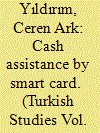

|
|
|
|
|
| Summary/Abstract |
A policy instrument can take on multi-dimensional objectives as additional elements are added over time. I examine this through analysis of the ‘support card’ established by the Turkish district municipality of Başakşehir. In this case, a market-based system of income support and instrument for partizan mobilization subsequently transformed into a technology demonstration project. The appearance of multiple objectives is the result of the juxtaposition of target audiences, including a European-based innovation network, low income urban residents, local businesses, and volunteers for the ruling Justice and Development Party (Adalet ve Kalkınma Partisi, AKP) party. This analysis also contributes to a better conceptualization of the AKP's capacity to enhance its legitimacy beyond electoral mobilization.
|
|
|
|
|
|
|
|
|
|
|
|
|
|
|
|
| 15 |
ID:
130972
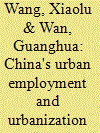

|
|
|
|
|
| Publication |
2014.
|
| Summary/Abstract |
The present paper argues that China's existing population and employment statistics are misleading, and have failed to include many of the migrant and labor force flows between urban and rural areas. The paper reconciles the differences between official census data and other survey statistics and attempts to recalculate China's urban population and employment figures. Our analyses indicate that official statistics of 2012 underestimate China's urban employment by approximately 47 million while overestimating rural employment by 31 million. The adjusted urbanization rate exceeded 55 percent in 2012, almost 3 percentage points higher than the official statistics. Nevertheless, there remains much potential for rural-to-urban migration. More specifically, if the current bottlenecks in household registration, social security and public welfare systems can be removed or relaxed, China's urbanization rate could rise by another 10 percentage points or even more over the next decade.
|
|
|
|
|
|
|
|
|
|
|
|
|
|
|
|
| 16 |
ID:
117493
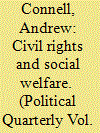

|
|
|
|
|
| Publication |
2012.
|
| Summary/Abstract |
This article draws on T H Marshall's celebrated classification of civil, political and social rights to examine the use of the courts by individuals seeking to establish rights to particular forms or models of welfare service provision. It argues that tensions between the collective and individual aspects of social rights, the relationship of social rights to inequality, and the difficulty of quantifying (and therefore enforcing) legitimate expectations, all make the use of litigation to establish social rights intensely problematic. Drawing on the recent UK Supreme Court case of R (on the Application of McDonald) v Royal Borough of Kensington and Chelsea, it goes on to suggest that it is unhelpful to think of social rights in terms of human rights: instead, we would do better to adopt Marshall's emphasis on the citizenship basis of social rights and on the social and political context within which they necessarily exist.
|
|
|
|
|
|
|
|
|
|
|
|
|
|
|
|
| 17 |
ID:
193262
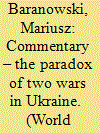

|
|
|
|
|
| Summary/Abstract |
The central thesis of this commentary focuses on the paradox of two wars occurring in parallel with Russian aggression in Ukraine. It is not just that—in addition to military action—there is a geopolitical tsunami and its consequences in the form of a possible food crisis, mass migration, or an already open energy war. The paradox relates to the fact that a potential Ukrainian victory could have adverse effects on the welfare of European countries as a consequence of the embargo on Russian hydrocarbons and the need to replace them (assuming there is no return to the ancien régime before the Russian aggression of February 24, 2022). The defeat of the Ukrainians, on the other hand, could lead to a so-called “new opening” and a gradual return to the import of Russian energy resources (which, although they will not obtain the pre-war volume, will provide energy stability for Europe in a period of diversifying contracts and developing investments in renewable energy sources).
|
|
|
|
|
|
|
|
|
|
|
|
|
|
|
|
| 18 |
ID:
058985
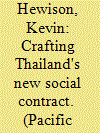

|
|
|
| 19 |
ID:
029514
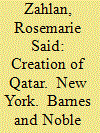

|
|
|
|
|
| Publication |
New York, Barnes and Noble Books, 1979.
|
| Description |
160p.: maps
|
| Standard Number |
0669004413
|
|
|
|
|
|
|
|
|
|
|
|
Copies: C:1/I:0,R:0,Q:0
Circulation
| Accession# | Call# | Current Location | Status | Policy | Location |
| 018640 | 953.63/ZAH 018640 | Main | On Shelf | General | |
|
|
|
|
| 20 |
ID:
155841
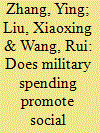

|
|
|
|
|
| Summary/Abstract |
Whether military spending is capable of promoting social welfare is currently a controversial issue. The aim of this paper is to investigate how military spending affects the input and output of social welfare (i.e. social welfare expenditures and social welfare index). A panel cointegration analysis and an impulse response function are conducted with multi-country panel data, over two time periods, 1998–2011 and 1993–2007. In addition, to extend a comparative analysis over different economies, BRICS (i.e. Brazil, Russia, India, China, South Africa) and G7 (i.e. the US, Japan, Germany, the UK, France, Italy, Canada) countries are selected as representatives of emerging economies and developed countries, respectively. The empirical results show that military spending enhances social welfare expenditures in developed countries, while the effect is ambiguous in emerging economies. Also, military spending is capable of promoting the social welfare index based on the FMOLS estimation. The comparative analyses indicate that unlike in the G7, the effect of the growth of military spending on the growth of social welfare expenditures is negative and shorter in the BRICS.
|
|
|
|
|
|
|
|
|
|
|
|
|
|
|
|
|
|
|
|
|